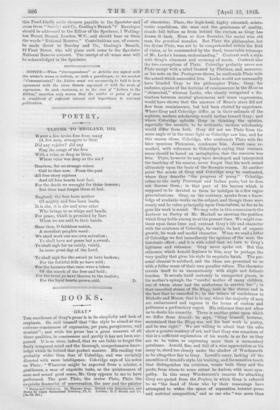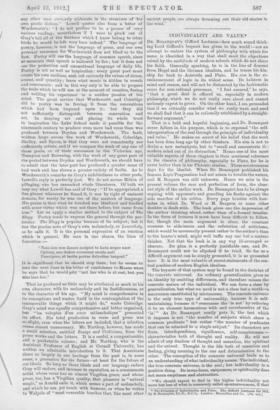BOOKS,
GRAY.* THE excellence of Gray's prose is in its simplicity and lack of emphasis. He said himself that " the style he aimed at was extreme conciseness of expression, yet pure, perspicuous, and Musical"; and while his prose has a great measure of all these qualities, in conciseness and purity it has not been sur- passed. It is so clear, indeed, that we are liable to forget the finely tempered mind and the thorough, comprehensive know- ledge which lie behind that perfect manner. His reading was probably wider than that of Coleridge, and was certainly directed with more intelligence. Coleridge says of his notes on Plato : " Whatever might be expected from a scholar, a gentleman, a man of exquisite taste, as the quintessence of sane and sound good sense, Mr. Gray appears to me to have performed. The poet Plato, the orator Plato, Plato the exquisite dramatist of conversation, the seer and the painter
Amalie awd, Criticisms, By Thomas (ray. Edited with Introduction and Notes by Clark !Sutherland Northup, Ph.D. London: D. C. Heath and Co. Gd. *et.] of character; Plato, the high-bred, highly educated, aristos eratie republican, the man and the gentleman of quality, stands full before us from behind the curtain as Gray has drawn it back. Even so does Socrates, the social wise old man, the practical moralist. But Plato the philosopher, but the divine Plato, was not to be comprehended within the field of vision, or be commanded by the fixed, immovable telescope of Mr. Locke's human understanding." Contrast such a style with. Gray's clearness and economy of words. Contrast also the two conceptions of Plato. Coleridge probably never saw Plato except with a mind biassed by Plotinus, and, moreover, as his note on the Protagoras shows, he confounds Plato with the school which succeeded him. Locke would not necessarily have blinded Gray to the philosopher Plato. Gray, for instance, speaks of the doctrine of reminiscence in the Mono as "chimerical," whereas Locke, who clearly recognized a dis- tinction between mental phenomena and sense impressions, would have shown that the answers of Meno's slave did not flow from reminiscence, but had been elicited by experience. Where Gray and Coleridge differ, as in their estimate of the sophists, modern scholarship would incline toward Gray ; and where Coleridge upholds Gray in thinking the epistles, especially the seventh, to be authentic, modern scholarship would differ from both. Gray did not see Plato from the same angle or in the Mille light as Coleridge saw him, and for this reason alone, Coleridge, who confounds Plato with the later spurious Platonism, condemns him. Jowett once re- marked, with reference to Coleridge's saying, that common sense should be based on metaphysics, that the converse was true. Plato, however lie may have developed and interpreted the teaching of his master, never forgot that his work rested ultimately upon the basis of the Socratic reason. At another point the minds of Gray and Coleridge may be contrasted, where they describe " the progress of poesy." Coleridge refers to the early Provençal and Italian poets, but he does not discuss them ; in that part of his lecture which is supposed to be devoted to them he indulges in a few vague generalizations. Gray, on the contrary, speaks from a know- ledge of available works on the subject, and though these were scanty and he relies principally upon Creseimbeni, as far as lie goes his work is sound. We may refer in this connexion to the Lectures on 'Poetry of Mr. Mackail as showing the position Which Gray holds among us at the present time. We might con- tinue upon these lines and contrast Gray's life and character with the existence of Coleridge, its vanity, its lack of organic growth, its weak and sordid character. When we read a letter of Coleridge we feel immediately the egotism of the man, the histrionic effort ; and it is with relief that we turn to Gray's lightness and reticence. Gray never spoke out. But this reticence, which Arnold deplores in him, may be perhaps the very quality that gives his style its exquisite finish. The per- sonal element is subdued, and the ideas are presented to us with a fuller sense of their own peculiar values. The character reveals itself to us unconsciously with slight and delicate touches. It reveals itself curiously in unexpected places, in his mother's epitaph, the "careful mother of many children, one of whom alone had the misfortune to survive her ; in that cancelled stanza of The Elegy, both in the stanza and in the fact that he cancelled it ; in the letters of condolence to Nicholls and Mason, that is to say, where the majority of men are embarrassed and express in the terms of custom and politeness a. perfunctory regret. His reticence does not allow us to doubt his sincerity. There is another point upon which we differ from Arnold : he says, "Gray himself, however, maintained that the Elegy was not his best work in poetry, and he was right." We are willing to admit that the odes show a greater mastery of art, and that Gray was conscious of this is a sufficient explanation of his words in so far as they are to he taken as expressing more than a momentary petulance. Arnold, fine, and full of a wise appreciation as his essay is, stood too closely under the shadow of Wordsworth to be altogether fair to Gray. Lowell's essay, lacking all the amenities of Arnold's style, his training, and the sensitive touch that distinguishes his criticism, treats both Gray and the poets, from whom to some extent he derives, with more sym- pathy. In this essay Wordsworth's reasons for attacking Gray are quoted from the Preface, in which Gray is referred to as "the head of those who by their reasonings have attempted to widen the space of separation betwixt prose and metrical composition," and as one who "was more than any other man curiously elaborate in the structure of 'hie, own poetic diction." 'Lowell quotes also from a letter of Wordsworth's " I do not profess to be a person of very. warious reading ; nevertheless if I were to pluck out of +C ray's tail all of the feathers which I know belong to other birds he would be left very bare indeed." The language, of poetry, however, is not the language of prose, and our own personal reverence for Wordsworth does not blind us to the fact. Poetry will use the language of common speech, since at moments that speech is hallowed by fire ; but it does not ese the pedestrian and unemotional language of daily life. Poetry is art as well as inspiration: every great poet must create his own medium, seek out curiously the values of stress, aeoent, and quantity ; learn what music is hidden in vowels and consonants ; and in this way only is ho able to prepare the tools which he will use at the moment of creation, fusing and welding his experience in a sudden passion of the amnd. The great service that Wordsworth and Coleridge did to poetry was in freeing it from the conventions which had been imposed upon it; but they did riot sufficiently distinguish between convention and art. In denying art and placing its whole trust in inspiration the Lake School made it possible for the nineteenth century to produce even more bad verse than was produced between Dryden and Wordsworth. The fault, written large across the work of Wordsworth, Coleridge, Shelley, and Byron, is that they were not consistently nor sufficiently artists, and if we compare the work of any one of these poets, or of their successors in the Victorian age, Tennyson and Browning, with the work of any great poet of the period between Dryden and Wordsworth, we should have to admit that the later poet has produced a greater mass of bad work and has shown a greater variety of faults. As to Wordsworth's remarks on Gray's indebtedness to other poets, Lowell's reply is perfectly just. Wo do not accuse Milton of pillaging, who has ransacked whole literatures. Of both we may say what Lowell has said of Gray : If he appropriated a fine phrase wherever he found it, it was by right of eminent domain, for surely be was one of the masters of language. His praise is that what he touched was idealized and kindled with seine virtue which was not there before, but came from him." Let us apply a similar method to the subject of The Elegy. Poetry tends to express the general through the par-, ticular. Ilte Elegy is popular because of its subject; but it has the precise note of Gray's own melancholy, or Leucoeholy, as he calls it. It is the personal expression of an emotion which is general. He uses in one stanza the lines of Lucretius :-
" Nam lam non domus accipiet to laeta neque uxor Optima, nee dukes occurrent oscula nati Praeripere, et tacita peetus dulcedine tangent."
If; is significant that ho should stop there ; but he seems to hint the next lines in his letter of condolence to Mason when he says that he would pity "not her who is at rest, but you who lose her."
That he produced so little may be attributed as much to his own character, with its melancholy and its fastidiousness, as to 'the character of his age. " My mind is comprehensive in its conceptions and wastes itself in the contemplation of the innumerable things which it might do," wrote Coleridge. Gray's mind was equally comprehensive and better organized, but " les volopt6s d'un &our ratlancholique " prevented its effort. His total production in verse and prose was so slight, even when the letters are included, that a selection seems almost unnecessary. Mr. Northup, however, has made a small selection, entitled Essays and Criticisms, from the prose works and the letters. It is a useful, a companionable, and a pocketable volume ; and Mr. Northup, who is the Assistant Professor of English at Cornell University, has written an admirable introduction to it. That Americans share so largely in our heritage from the past is, in some sense, a guarantee for the future—at least for the future of our ideals. So long as these ideals and our language endure Gray will endure, and increase in reputation, as a consummate artist -whose verse has an almost Tirgilian grace, and whose prose, too, has a Virginal). quality, that pleasure in "natural magic.," as Arnold calls it, which seems a part of melancholy, and which he can yet touch with humour, as when he writes to Walpole of "most venerable beeches that, like most other
ancient people, are always dreaming out their old stories tc the wind."







































 Previous page
Previous page